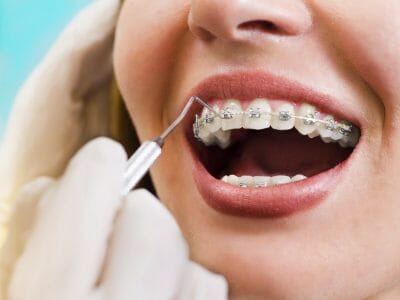Orthodontic Restorations
 What are orthodontic restorations?
What are orthodontic restorations?
Sometimes, patients require restorative treatments after orthodontic therapy. In some cases, the teeth may have worn down or fractured. In other cases, after years of not wearing braces or retainers, teeth may begin shifting from their corrected positions. Other patients may require restorative work such as the repositioning of a tooth that has come out of alignment, or the replacement of a lost tooth.
To ensure that your orthodontic treatment is top quality, Dr. Harding will refer you to a trusted orthodontic specialist. If you require restorations to past orthodontic work, however, he can perform those in our office.
What treatments are considered restorative?
Restorative work is any procedure that is performed to keep your mouth functioning optimally. Restorative work also improves the appearance of your teeth and smile.
Restorative procedures may include any treatment that restores function to a tooth. For example, a dental filling or crown that restores a tooth’s ability to withstand pressure during chewing may be considered a restorative procedure.
Procedures that repair damaged teeth are considered restorative treatments. These treatments may include:
- Enamel bonding
- Inlays and onlays
- Crowns
- Resin or porcelain veneers
These treatments repair or cover damaged teeth to restore their appearance as well as their function.
Restorative work may also include dental implants, bridges, and other prostheses to fill in for missing teeth and restore balance and symmetry to the bite, as well as healthy chewing function.
Can I get restorative work done following orthodontic treatment?
Yes. Typically, orthodontists focus specifically on straightening and properly aligning the teeth and jaw, and are not specialized in providing restorative treatments for their patients, such as filling in chips and cracks. These types of restorative procedures are best handled by a general dentist with experience in restorative work, such as Dr. Harding.
Should restorative work happen before or after orthodontic treatment?
The question of whether teeth should be restored before, during, or after orthodontic therapy is vital to the successful treatment of many patients. Many individuals require both types of work to maintain optimal oral health and an attractive appearance.
Sometimes a patient may require extensive restoration of such problems as chipped or cracked teeth, missing teeth, and damaged tooth enamel. They may also require orthodontic work to correct teeth that are crooked, overcrowded, misaligned, or to fix such conditions as an overbite or underbite. In those instances, Dr. Harding will confer with the orthodontic specialist to ensure that all necessary orthodontic and restorative treatments are carried out in the most suitable sequence for each individual.
Because each patient is unique, every case must be determined individually and treatment personalized for each patient. In some cases, it is wise to complete orthodontic work before performing any restorative procedures, because having the teeth positioned properly using orthodontic therapy may facilitate certain restorations. In other cases, it may be vital to replace missing teeth before undergoing orthodontic treatment. Dr. Harding can help you determine the best course of action for your individual needs. Contact our office today to learn more.

 What are orthodontic restorations?
What are orthodontic restorations?